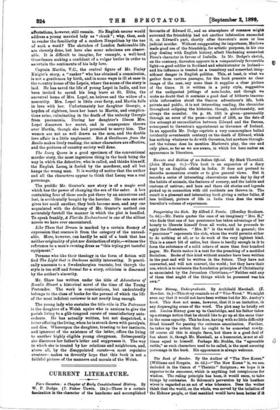CURRENT LITERATURE.
favourite of Edward II., and an atmosphere of romance might surround the friendship had not another infatuation succeeded it, on Edward's part, shortly after Gaveston's more or less judicial murder. Without exaggerating its importance, Marlowe made good use of the friendship, for artistic purposes, in his one play dealing with English history, albeit blackening somewhat Piers's character in favour of Isabella. In Mr. Dodge's sketch, on the contrary, Gaveston appears in a comparatively favourable light—a good soldier in Scotland and administrator in Ireland— and his influence is treated as a transitory and somewhat insig- nificant danger in English politics. This, at least, is what we gather from various passages, for the book presents no clear image of the man, any more than it supplies a clear picture of the times. It is written in a jerky style, suggestive of the undigested jottings of note-books, and though we make no doubt that it contains a good deal of hitherto inacces- sible information about the Gascon adventurer's life, both private and public, it is not interesting reading, the chronicler throughout eclipsing the historian, though, unfortunately, not always the moralist. On p. 88, 1301 is given—presumably through an error of the press—instead of 1308, as the date of the attempt at reconciliation between Edward and the Barons, subsequent to Gaveston's appointment as Governor of Ireland. In an appendix Mr. Dodge reprints a very commonplace ballad (evidently seventeenth century) on the death of Edward, which has nothing whatever to do with Gaveston, but nowhere through- out the volume does he mention Marlowe's play, the one and only place, so far as we are aware, in which his hero makes an appearance in literature.


































 Previous page
Previous page